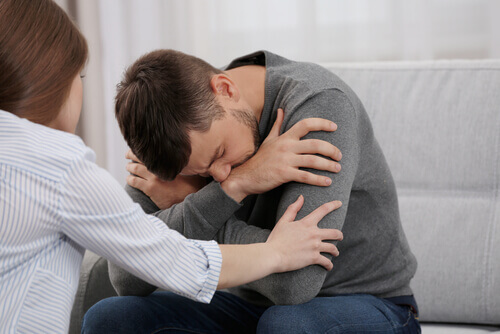Anxious Attachment or an Avoidant Partner?

Anxious attachment is a type of bond in which restlessness, possessiveness, and insecurity predominate in the relationship with the loved one (in the context of the couple). In principle, it’s due to unresolved problems in whoever establishes this type of link. However, there are times when the anxious behavior is also triggered or fueled by the other partner.
It’s said that paranoid people often get persecuted. This is more or less what frequently happens in cases of anxious attachment. Although there’s basic insecurity, the one who feels it isn’t the same person who nurtures or triggers it. In other words, a partner can cause a more or less healthy attachment to become anxious.
It’s not easy to distinguish a case of anxious attachment from one in which the partner is avoidant and triggers anxiety. For the same reason, many people in situations like this can’t answer the question: is it my insecurity that’s making me anxious with my partner or is it my partner’s behavior that’s making me anxious?
The normal anxiety that we were talking about is the anxiety that everyone feels and all of us need to be aware of, to face constructively and to use creatively as the cave man used it originally to develop the power to think, and therefore to survive in the conflict with the animals.
-Rollo May-

Anxious attachment
Anxious attachment, also called ambivalent attachment, is a form of attachment in which the individual has a great desire for intimacy with their partner but, at the same time, they have a deep fear of losing them. This feeling leads to an apprehensive interpretation of any manifestation, no matter how minimal, of distancing or rejection.
They’re people with a great capacity to be intimate with their partner and to feel extremely close to them.
In fact, the anxious person believes that certain of their partner’s behaviors implies distancing or rejection, even though this isn’t the case. Consequently, they tend to distrust their partner and react in a disproportionate way to their perfectly normal behavior.
In these cases, the partner’s response is extremely important. Ideally, they should adopt an understanding attitude and understand that their partner’s anxiety stems from deep insecurities and often unresolved trauma. An anxiously attached person needs more warmth and security from their partner and, if the partner learns to give them confidence, their anxiety will decrease.
The trigger of anxious attachment
There are several situations that trigger this insecurity and fear in the anxious person. It may be within the mind of the sufferer, but it also responds to certain external stimuli. Let’s look at some of the mental processes of people who suffer from anxious attachment. They have a tendency to:
- Think about their partner most of the day.
- Idealize their partner, overestimating their strengths and downplaying (or ignoring) their flaws.
- Suffer anxiety when they’re not with their partner.
- Think that they’ll never be able to love another person.
- Endure toxic dynamics so as not to abandon the relationship.
- Be hypervigilant over their partner’s reactions.
- Fear upsetting their partner.
- Fear being abandoned by their partner.
- Be afraid of expressing themselves and getting angry with their partner.
The avoidant partner
Someone with anxious attachment needs a partner to take care of their insecurities and fears, not increase them. However, an avoidant partner does just that: increases their anxiety and reinforces this type of harmful attachment. They might often do it without even realizing it. On the other hand, they might turn it into a power mechanism.
An avoidant partner is one who flees or keeps silent in the face of conflict. They’re also those who seek to solve problems quickly, without delving into what’s really happening. They might intellectualize everything, preventing any emotions from arising. Furthermore, they might become irritated or uncomfortable when their partner cries or shows expressions of suffering.
Another characteristic of this type of person is a lack of emotional availability. It’s really damaging for an anxious person to have a partner who won’t really recognize the relationship or hates commitment and insists that they want a relationship with ‘no strings’. Also, those who ridicule or minimize emotions. This kind of behavior increases insecurity in their anxious partners.

Is it me or is it them?
It’s often difficult to know if a couple is made up of one partner who suffers from a chronic anxious attachment and the other is unable to deal with their inappropriate behavior. Or, if one partner has a normal attachment but becomes anxious because their partner says and does things that increase certain of their unresolved insecurities.
To answer the question of whether it’s anxious attachment or avoidant behavior that predominates in an uncomfortable relationship it’s important to identify the kinds of fears that are completely valid:
- Fear that their partner doesn’t want to commit.
- Fear that a conflict can never be fully resolved because their partner refuses to face it.
- Being afraid of not being heard or understood by their partner.
- Fear of being vulnerable with their partner.
If any of these fears are present, it’s probably due to an avoidant partner. The other fears (especially when they’re exceptionally intense), such as the fear of losing the partner, speak of a predominance of anxious attachment in the relationship rather than an avoidant partner.
What to do in these cases?
Attachment style is something that deeply marks people in their adult lives. However, this doesn’t mean that it can’t be corrected. Whether the avoidant style causes insecurities or whether there really exists an anxious attachment, couples therapy can help establish effective communication and rebuild (or build) a healthy emotional bond.
On the other hand, individual therapy will be the best option to learn to control symptoms such as negative thoughts, difficulties in coping with conflicts, or developing empathy. Finally, a couple should never hesitate to try and solve their problems before their relationship deteriorates too much.
All cited sources were thoroughly reviewed by our team to ensure their quality, reliability, currency, and validity. The bibliography of this article was considered reliable and of academic or scientific accuracy.
- Casullo, M. M., & Liporace, M. F. (2005). Evaluación de los estilos de apego en adultos. Anuario de investigaciones, 12, 183-192.
- Salazar Gutiérrez, S. G., & Sotelo Castro, A. F. (2021). Influencia del apego adulto sobre la dependencia emocional en las relaciones de pareja de estudiantes universitarios.
- Chicomin Torres, J. C. (2021). El apego inseguro en la infancia y su repercusión en las relaciones de pareja en adultos.
This text is provided for informational purposes only and does not replace consultation with a professional. If in doubt, consult your specialist.








